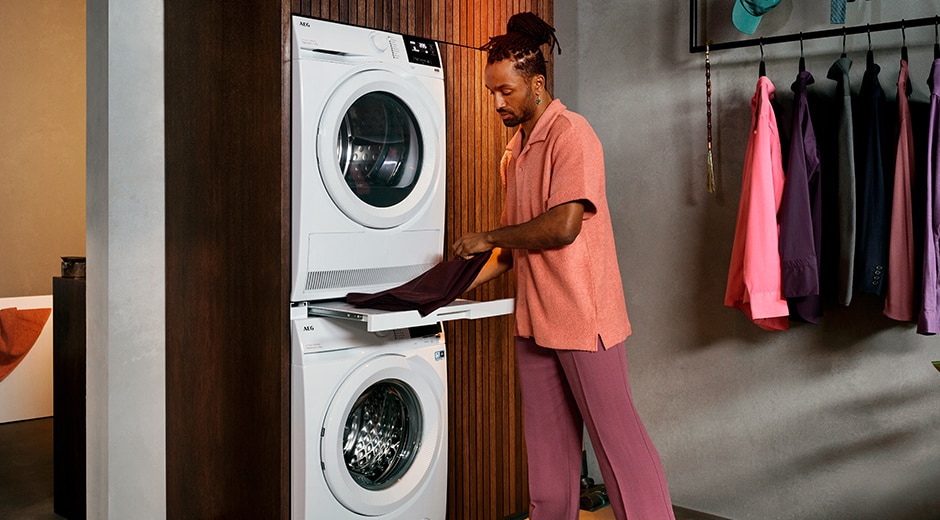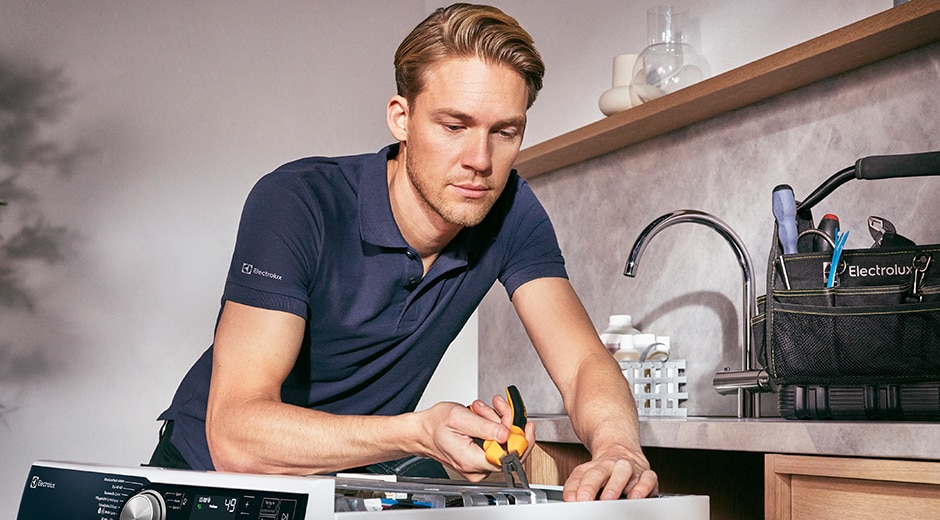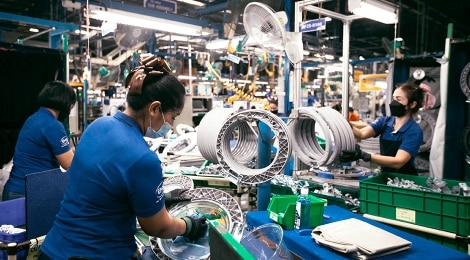Meeting the growing global market for household appliances without increasing environmental impact requires the Group to further optimize product performance and make better use of resources.

Lead in energy and resource-efficient solutions
Electrolux Group is creating ever more efficient, high-performance appliances, which help consumers to live better lives, save money and reduce their environmental footprint.
The Goal
Electrolux Group will continuously improve the energy and water performance of its appliances, raising the bar for product efficiency around the world.
Roadmap to 2030
- Be a leader in product efficiency for key categories and markets by 2030.
- Continue to develop products with good environmental performance, with a focus on energy and water efficiency.
- Continue to drive the market for efficient products by integrating sustainability into the Group’s brands.
The case for action
Tackling climate change by reducing greenhouse gas emissions is one of the most urgent global challenges facing society. As product energy use is responsible for approximately 85% of Electrolux Group’s climate impact, product energy efficiency is where it can have the greatest contribution to tackling climate change. Energy-efficient appliances can help to save energy and thus reduce greenhouse gas emissions. The move towards energy sourced from renewable sources in the homes of millions of consumers around the world would make a big difference in terms of emission reduction.
Water is an important global issue. Consumption has increased globally by roughly 1% per year over the last 40 years and is expected to grow at a similar rate until 2050.1) As a manufacturer of dishwashers and washing machines, Electrolux Group has a role to play in helping people to use less water in their homes — as well as promoting water efficiency in its operations.
Internal studies have shown that dishwashers could save up to 90 liters of water and use up to 60% less energy in a single cycle compared with handwashing.2)
Read more about our progress on this Goal
Sources:
1) The United Nations World Water Development Report 2023, p.1. www.unesdoc.unesco.org/ark:/48223/pf0000384655
2) Comparing water/energy consumption per wash for ECO program of D class and above with EU average consumption for handwashing (as established by Stamminger et al. Washingup behaviour and techniques in Europe (2007) considering 12 plate sets).

Offer circular products and business solutions
Electrolux Group will proactively contribute toward the circular economy by integrating a circular approach into its products and solutions.
The Goal
The Group will contribute to the circular economy by integrating recycled materials into its product platforms, promoting recyclability, using more sustainable packaging solutions, increasing the availability of spare parts to repair its products, and developing circular business solutions.
Roadmap to 2030
- Where possible, replace virgin materials with recycled materials in the Group’s products.
- Increase the proportion of recycled plastic the Group uses to 50% by 2030.
- Reduce the carbon footprint of steel in the Group’s production, for example by increasing the amount of steel that is manufactured with higher scrap content.
- Reduce the greenhouse gas emissions from the steel the Group uses in its products by 30% by 2030.
- Identify and evaluate relevant circular business models that can be scaled up.
The case for action
Electrolux Group has an important role to play in enabling people to live more circular lives through its products and solutions. In this way, the Group can help overcome resource challenges while meeting the need for a more circular and low-carbon society.
Population growth and raw materials
As the global middle class continues to grow,1) the demand for mate rial resources, such as steel, plastic and electronic components, will increase. At the same time, many industries are based on virgin materials that are non-renewable and fossil based. For example, more than 400 million metric tons of plastic are produced globally each year and only about 12% comes from recycled materials.2) However, there are opportunities to source materials with recycled content, and even bio-based materials from renewable sources.
The need for a circular economy
According to the 2023 Circularity Gap Report by Circle Economy,3) only 7.2% of the resources used globally are cycled back into the economy after use. This compares to 9.1% in 2019. The report stresses the need for a circular economy that makes better use of resources to prevent further and accelerated environmental degradation and social inequality.
Consumers are increasingly demanding more circular products and solutions. This includes everything from recycled materials incorporated into products and more sustainable packaging, to solutions that enable them to extend the lifespan of their products. Electrolux Group’s own research has shown that consumers perceive products containing recycled plastics to be more innovative, premium, high quality and sustainable.
Greenhouse gas emissions
Materials are the Group’s second largest source of greenhouse gas (GHG) emissions after product use. Virgin materials cause considerable GHG emissions through their extraction and manufacturing. By sourcing recycled plastic and steel manufactured with higher scrap content, Electrolux Group can make a significant reduction to its greenhouse gas emissions from materials.
Emissions can also be reduced by extending the useful lifespan of products. This can be achieved through promoting more circular business models or providing aftermarket services that enable longer product lifetime and ultimately make better use of resources.
Read more about our progress on this Goal
Sources:
1) Visual Capitalist. 113 Million People Will Enter the Global Consumer Class in 2024. www.visualcapitalist.com/113-million-people-middle-class-2024/#
2) OECD Environment Policy Paper no. 12, 2018
3) Circle Economy. Circularity Gap Report. www.circularity-gap.world/2023#

Eliminate harmful materials
Electrolux Group’s consumers can feel reassured that it manages chemicals carefully and replaces those that cause concern.
The Goal
The Group will protect people and the environment by managing chemicals carefully and continuing to replace those that cause concern.
Roadmap to 2030
- Implement a best-in-class global system for improving the control of chemicals throughout the Group’s complex supply chain and work with suppliers to replace chemicals of concern.
- Raise the bar on chemical requirements, taking into account new scientific findings.
- Eliminate high-impact greenhouse gases from Electrolux Group products.
The case for action
With more than 40,000 commercial substances in use and global sales expected to double between 2017 and 2030,1) chemicals must be carefully managed to avoid detrimental impacts on human health and pollution to air, soil or water. According to the European Environment Agency, about 6% of the world’s disease burden — including chronic diseases, cancers, neurological and developmental disorders — and 8% of deaths can be attributed to chemicals.2)
Various chemicals are used in the appliance industry and the impact of chemicals on people and the environment is high on the Electrolux Group’s agenda. The Group wants consumers to feel reassured that it has a robust approach to selecting materials for its products — to protect both human health and the environment. Consumers are raising their expectations on appliance companies such as Electrolux Group on the management of chemicals in products.
Phasing out the use of high-impact greenhouse gases is an important part of the Group’s approach to chemical management as they have historically been a significant contributor to its climate footprint.
Read more about our progress on this Goal
Sources:
1) World Health Organization (2022). Guidance on chemicals and health. www.who.int/tools/compendium-on-health-and-environment/chemicals
2) European Environment Agency. www.eea.europa.eu/signals-archived/signals-2020/articles/living-healthily-in-a-chemical-world



